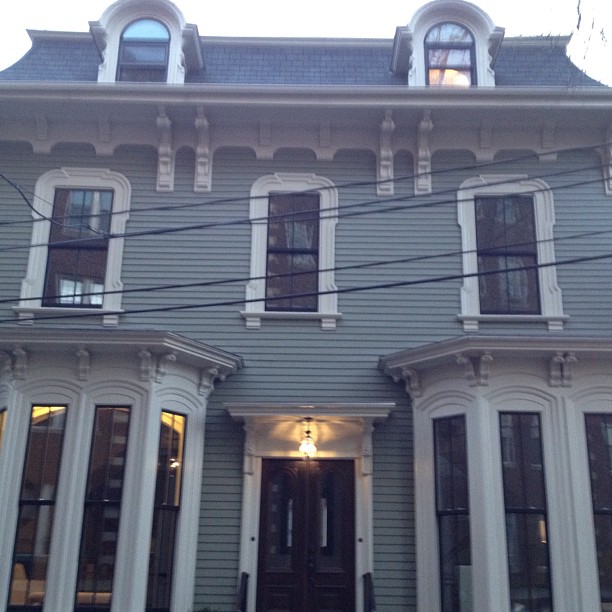 At 44 Follen Street, near Cambridge Common, sits a quiet three-story Victorian with a raucous past.
At 44 Follen Street, near Cambridge Common, sits a quiet three-story Victorian with a raucous past.
The Society
The house itself was built in 1862 and was woven into the history of the Law School when in 1947, the Lincoln’s Inn Society bought it. The Lincoln’s Inn Society was founded in 1907, named after the Honourable Society of Lincoln’s Inn in London. In 1909, it was organized under the Commonwealth of Massachusetts as a corporation “constituted for the purpose of establishment and maintenance of a place social meetings.”
When the Lincoln’s Inn Society bought 44 Follen, it dubbed the house Lincoln’s Inn and made it a hangout for Harvard Law students. It had its own sports bar, beer on tap, and a pool table, and was, according to a Crimson article, “littered with beer cans and stolen Kong signs.”
But in the 2006-07 school year, the student-run Board of Governors of Lincoln’s Inn Society closed its doors to re-evaluate the future of both the house and the Society. The Board was having trouble maintaining the century-old house and membership had fallen dramatically, with just 50 to 60 members instead of its historical 100. The annual $350 membership fees and the fraternity-like atmosphere allegedly deterred students from joining. In April of 2007, Lincoln’s Inn announced that HL Central, Inc. would now manage both the house and the Society.
HL Central, Inc.
HL Central had a much shorter history than Lincoln’s Inn Society. It was founded in 2000 by T.J. Duane, Law ’02, as HL Central, Inc. a nonprofit corporation. Its articles of organization stated its purpose was to “build a sense of community…”, “cultivate compassion and a desire among the Harvard Law School Community to engage in volunteer efforts…”, “foster a more welcoming law school environment for new students…” , “facilitate student awareness of the broad metropolitan area…”, and “facilitate access to educational resources…” In 2002, it reported an annual revenue of $36,300 to the Massachusetts Attorney General’s office.
In 2004, HL Central, Inc. was reorganized as domestic for-profit organization. Its stated purposes remained largely the same, except with an addition that explicated its relationships to law firms: it declared one of its purposes was “to provide a service for law firms and other professional organizations that are recruiting Harvard Law School students, which allows for greater communication between the students and prospective employers.”
New Management
In April 2007, Lincoln’s Inn posted on its blog that it would now be managed by HL Central. According to a member of Lincoln’s Inn’s Board of Governors, Elizabeth Russo, Law ’09, who was also the incoming HL Central Executive Director in April 2007, the shift was only one of management: “[Lincoln’s Inn] still exists as a separate entity, with its own bank account. The HL Central Board agreed to manage the Lincoln’s Inn Society and took over responsibilities for continuing the traditions of the Society (like planning annual events). The connection between the two entities is in the overlap between the management.” According to Russo, Lincoln’s Inn Society is still a nonprofit corporation, unlike HL Central, which is a for-profit organization.
“The Lincoln’s Inn Society is a separate entity from HL Central and it has its own budget. It is a private company run as a not-for-profit and generally does not share more specific financial information.” Director of Lincoln’s Inn Society Marina Malomud, Law ’13, said, “Lincoln’s Inn Governors manage Lincoln’s Inn activities and are also HL Central Executive Board members.”
HL Central originally planned to renovate the house and re-open it as a “meeting and activity space for all students and student organizations” the following year, according to an April 6, 2007 post on the now inactive Lincoln Inn blog and an April 5, 2007 article in The Crimson.
Sale
But in 2009, the house was sold instead. At the time, 44 Follen was condemned, the mortgage was close to undergoing foreclosure, and the City of Cambridge had placed a tax lien against the property. Prospective renovations were projected to cost $1.2 million, and “since this was 2009, there was no way to get a loan to do the work,” according to Russo.
Lincoln’s Inn Society attempted several other efforts to subsidize the cost of renovation, including approaching the Law School and conducting an alumni fundraising campaign; however, “there was not sufficient interest,” according to Russo. “The only option was to sell the building. After sales taxes, the mortgage and Cambridge taxes were paid, the money which was left was put into the Lincoln’s Inn bank account and has been funding Society activities since 2010.”
According to Zillow, the online real estate database, the house was sold in 2009 for $1.1 million.


